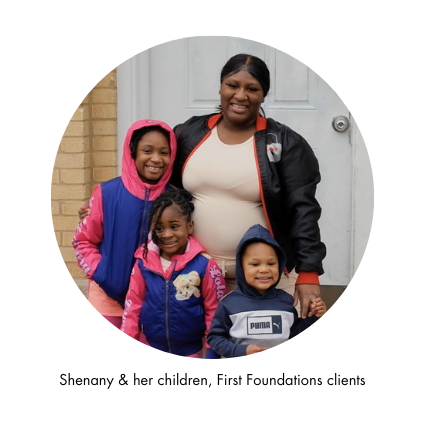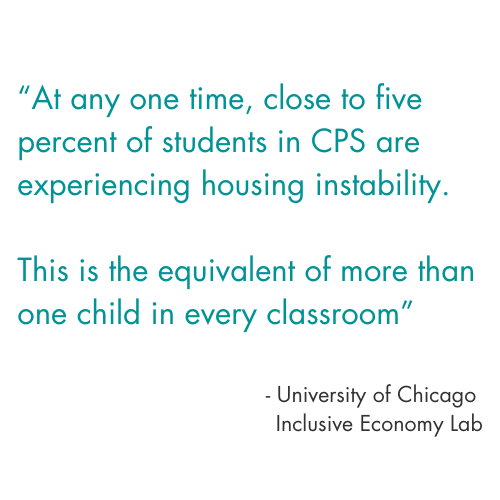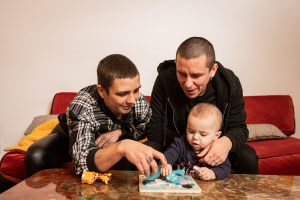September 21, 2023 | 8-9 min read
The effects of homelessness on families with children can be numerous and wide-ranging. Expecting parents face significantly higher rates of pregnancy complications and preterm deliveries. Meanwhile for children, homelessness is associated with increased anxiety and depression, social isolation, and difficulty focusing in school.
Addressing the multi-generational effects of homelessness requires a multi-generational approach. Facing Forward ensures that each family member can simultaneously build stability by using a Two-Generation (Two-Gen) Model to provide individualized services that address the needs of both children and adults in a household.
Trust and accessibility are essential to Facing Forward’s Two-Gen work. Many parents experiencing homelessness may hesitate to seek assistance due to stigma or fear of being separated from their children. Additionally, other families facing “doubled-up” homelessness—staying with family or friends—often do not qualify for government housing programs, making the need to increase accessibility essential.
Facing Forward's innovative programs for families, First Foundations and Home Connection, decrease the barriers to stable housing and aim to help families break generational cycles of homelessness for good.
First Foundations
Launched in 2021, First Foundations is a pilot program serving families experiencing homelessness during the early developmental stages of a child’s life. Families expecting a child, or with children under 3, were invited to participate in the program through referrals from Facing Forward's community partners New Moms, Westside Healthy Start, and Primo Center. Since its inception, the First Foundations program has provided 19 families with two years of subsidized housing, tailored case management support, and wraparound services aimed at building family-wide stability. 
Once families are stably housed, Facing Forward helps them identify and map out a plan to reach their goals for education, employment, and parenting. Families living on their own for the first time also work with case managers to build life skills like taking care of an apartment and managing bills.
In addition to working closely with their case manager, expecting parents can work with Facing Forward’s Early Childhood Advocate to address healthcare concerns, create a birth plan, and access a wide range of resources and services such as in-home developmental screenings. Facing Forward also provides parents with a unique opportunity to receive free services from doulas -- trained professionals who provide guidance and physical and emotional support throughout every step of the birthing process. With families having a safe place to call home and a system of support, every pregnancy within First Foundations thus far has resulted in a healthy full-term delivery.
Being a new parent can be particularly challenging for members of our community navigating the aftermath of traumatic experiences such as homelessness. Canentra Williams, Senior Program Manager for First Foundations, explains that when families first come into the program, many are “functioning within their trauma. They’re operating in survival mode, or crisis mode, all the time.”
Even after being housed, families can struggle to shift away from this mindset, and to do so, it is vital for parents to surround themselves with a strong community of trusted professionals, friends, and family. Families in the program are continually developing and strengthening their crisis management skills and support networks. Canentra emphasizes that a basic but essential Facing Forward service is simply to “continue to show up for people and be consistent. We want families to know that we are here to support them in every way we can and that we will go at their pace.”
Home Connection
Facing Forward's Home Connection program serves Chicago Public Schools (CPS) students and their families who are experiencing, or at risk of experiencing, homelessness. The program creates a unique opportunity to increase housing stability for families in shared living arrangements (also known as "doubled-up" homelessness) and who are not included under the U.S. Department of Housing and Urban Development's definition of homelessness. Families experiencing doubled-up homelessness are often excluded from government programs despite accounting for over 75% of the nationwide homeless population. Facing Forward works in partnership with CPS to promote the program to students and their families, and also with the University of Chicago Inclusive Economy Lab to study the program’s impact. Since launching in 2021, Home Connection has provided housing-focused case management, rental subsidies, and short-term financial assistance to over 250 individuals.
 At any one time, close to 5% of students in CPS are experiencing housing instability, so much so that each public school in Chicago has a Students in Transitional Living Situations (STLS) liaison. To increase access to the services offered through Home Connection, Facing Forward partners with CPS liaisons to promote the program via counseling and the distribution of flyers with QR codes that lead to an easy-to-fill application for assistance.
At any one time, close to 5% of students in CPS are experiencing housing instability, so much so that each public school in Chicago has a Students in Transitional Living Situations (STLS) liaison. To increase access to the services offered through Home Connection, Facing Forward partners with CPS liaisons to promote the program via counseling and the distribution of flyers with QR codes that lead to an easy-to-fill application for assistance.
Once in the program, families work with a case manager to assess their current living situation and create a plan to alleviate their housing issues while increasing stability for students in the household. Families are encouraged to work with Facing Forward’s Family Empowerment Team which provides numerous educational and career-based services. The team’s Education Advocate offers tutoring and personalized mentorship for students while simultaneously helping parents advocate for their children’s needs by developing incentive plans, IEPs, and other academic supports. Education Advocates also help students access books, school supplies, and even after-school activities that support their social-emotional development. The team’s Career Advocate can help clients explore options for post-secondary education and guidance for those looking to enter the workforce. Alongside Facing Forward’s services, families have access to over 100 community service partners that offer pathways to everything from furniture to legal counseling.
Facing Forward’s staff consistently caters their services to the specific goals and needs of each family member. Personalized care is at the core of our Two-Gen approach and is essential for helping families to exercise their sense of agency. Canentra Williams, who also heads the Home Connection program, emphasizes how, "through Home Connection, children and young adults develop a sense of responsibility within their family, understanding that they are individuals and can make their own choices.”
Breaking the Cycle
Because of the profound effect homelessness has on the children in a family, homelessness is all too likely to persist across generations. According to a study conducted by University of California San Francisco, children who experience homelessness, regardless of how long, are 40% more likely to face homelessness as adults. Providing housing is often not enough to break the ongoing cycles of homelessness and poverty; it must be accompanied by a community of support that works together to help people grow in agency and overcome obstacles. Through low-barrier, Two-Generation programs like First Foundations and Home Connection, Facing Forward seeks to address gaps in available supports for our neighbors, helping families to build housing stability and forge individual paths to success.
To access the Home Connection self-interest form, click here.


